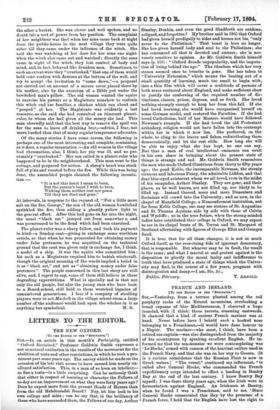LETTERS TO THE EDITOR.
THE NEW OXFORD.
[To THE EDITOR OF THE " SPECTATOR."] SIR—In an article in this month's Fortnightly, entitled " Oxford Revisited," Professor Goldwin Smith expresses a not unnatural exultation in the results of the movement for the abolition of testa and other restrictions, in which he took a pro- minent part some years ago. The survey which he made on the occasion of his late visit seems to have caused him nearly un- alloyed satisfaction. This, in a man of so keen an intellect— so fine a taste—is a little surprising. Can he seriously think that either in respect of learning or character the Fellows of to-day are an improvement on what they were forty years ago ? Does he expect more from the present Heads of Houses than from the old Hebdomadal Board ? Nay, let him look to his own college and mine ; can he say that, in the brilliancy of those who have succeeded them, the Fellows of our day, Arthur Stanley, Donkin, and even the good Shadforth are outdone, eclipsed, and forgotten ? My brother said in 1865 that Oxford had given herself prodigally to sides and heroes not his, "only never to the Philistines." That boast is hers no longer. She has given herself body and soul to the Philistines ; she has renounced all that is devoted and austere ; she is ner- vously sensitive to opinion. As Mr. Goldwin Smith himself says (p. 158) : "Oxford dreads unpopularity, and the imputa- tion of being behind the age." The idealism which her very stones seemed once to breathe is gone. She has taken to "University Extension," which means the beating out of a small quantity of learning, much too small to begin with,. into a thin film which will cover a multitude of persons of both sexes scattered about England, and make sufficient show to justify the conferring of the required number of dis- tinctions, classes, prizes, degrees, and so forth, She loved nothing strongly enough to keep her from this fall. If she had loved learning, she would have reorganised herself on some German model, and restored the Faculties. If she had loved Catholicism, half of her Masters would have followed; Newman's example. If she had loved the old Protestant orthodoxy, religion would not have fallen into the contempt within her in which it now lies. She preferred, on the whole, to cling to the loaves and fishes, redistributing them democratically, and let the rest slide. How long she will be able to enjoy what she has kept, no one can say. But that a man of real intellectual eminence can exult in his own share in bringing about the present state of things is strange and sad. Mr. Goldwin Smith remembers. the men who made Oxford illustrious from thirty to fifty years ago ; the good Keble, the incomparable Newman, the sternly virtuous and laborious Pnsey, the admirable Liddon, and that dear blue-eyed aristocrat whom we all loved, even in the midst of his escapades, Arthur Stanley. They are gone, and their' places, as he well knows, are not filled up, nor likely to be filled up. Instead thereof, more and more Dissenters and. Socinians will crowd into the University ; and as now, in the chapel of Mansfield College, a Nonconformist institution, not far from Keble College, one may see statues of St. Augustine and St. Thomas Aquinas side by side with those of Calvin and Wycliffe ; so in the near futur- e, when the strong-minded ladies have established their college in Oxford, we may expect to see in its chapel busts of St. Teresa and St. Margaret of Scotland alternating with figures of George Eliot and Georges Sand.
It is true that for all these changes, it is not so much Oxford itself, as the ever-rising tide of ignorant democracy, that is responsible. But whoever may be in fault, the result is the same; and what I marvel at and protest against is the disposition to glorify the moral laxity and indifference to truth that have produced a state of things which the Univer- sity may find, in the course of a few years, pregnant with disintegration and decay.—I am, Sir, &c.,






































 Previous page
Previous page